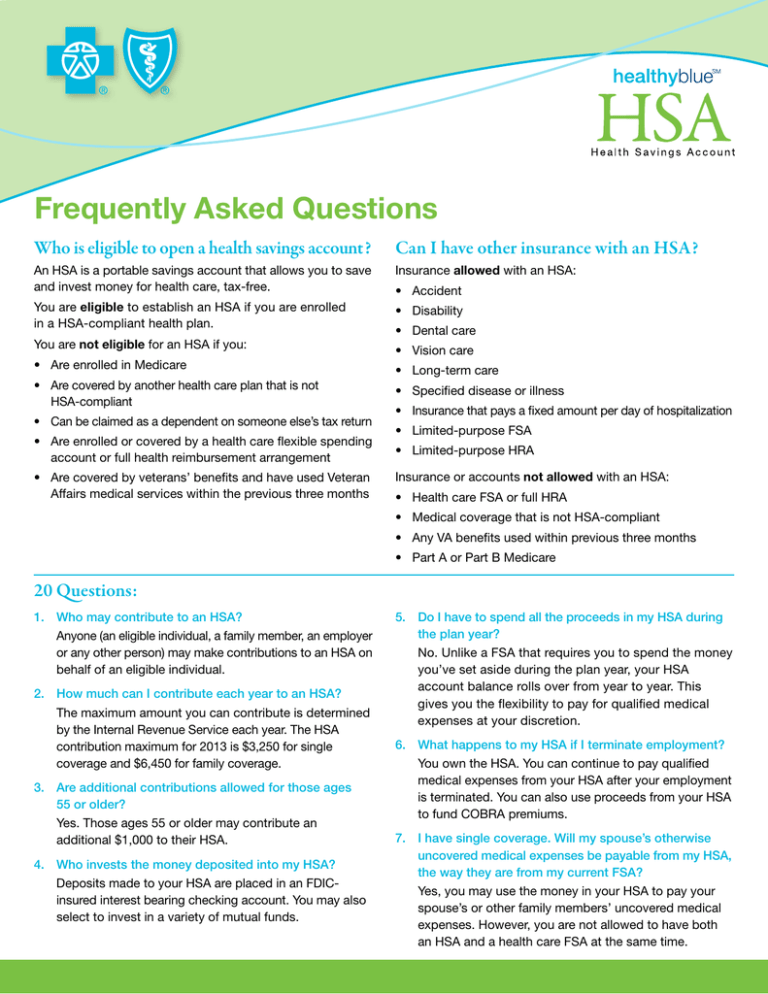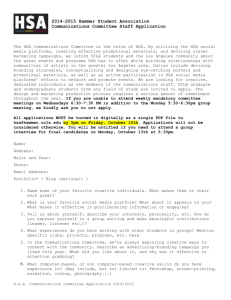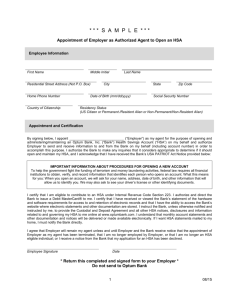Frequently Asked Questions Can I have other insurance with an HSA?
advertisement

Frequently Asked Questions Who is eligible to open a health savings account? Can I have other insurance with an HSA? An HSA is a portable savings account that allows you to save and invest money for health care, tax-free. Insurance allowed with an HSA: You are eligible to establish an HSA if you are enrolled in a HSA-compliant health plan. • Disability You are not eligible for an HSA if you: • Are enrolled in Medicare • Are covered by another health care plan that is not HSA-compliant • Can be claimed as a dependent on someone else’s tax return • Are enrolled or covered by a health care flexible spending account or full health reimbursement arrangement • Are covered by veterans’ benefits and have used Veteran Affairs medical services within the previous three months • Accident • Dental care • Vision care • Long-term care • Specified disease or illness • Insurance that pays a fixed amount per day of hospitalization • Limited-purpose FSA • Limited-purpose HRA Insurance or accounts not allowed with an HSA: • Health care FSA or full HRA • Medical coverage that is not HSA-compliant • Any VA benefits used within previous three months • Part A or Part B Medicare 20 Questions: 1. Who may contribute to an HSA? Anyone (an eligible individual, a family member, an employer or any other person) may make contributions to an HSA on behalf of an eligible individual. 2. How much can I contribute each year to an HSA? The maximum amount you can contribute is determined by the Internal Revenue Service each year. The HSA contribution maximum for 2013 is $3,250 for single coverage and $6,450 for family coverage. 3. Are additional contributions allowed for those ages 55 or older? Yes. Those ages 55 or older may contribute an additional $1,000 to their HSA. 4. Who invests the money deposited into my HSA? Deposits made to your HSA are placed in an FDICinsured interest bearing checking account. You may also select to invest in a variety of mutual funds. 5. Do I have to spend all the proceeds in my HSA during the plan year? No. Unlike a FSA that requires you to spend the money you’ve set aside during the plan year, your HSA account balance rolls over from year to year. This gives you the flexibility to pay for qualified medical expenses at your discretion. 6. What happens to my HSA if I terminate employment? You own the HSA. You can continue to pay qualified medical expenses from your HSA after your employment is terminated. You can also use proceeds from your HSA to fund COBRA premiums. 7. I have single coverage. Will my spouse’s otherwise uncovered medical expenses be payable from my HSA, the way they are from my current FSA? Yes, you may use the money in your HSA to pay your spouse’s or other family members’ uncovered medical expenses. However, you are not allowed to have both an HSA and a health care FSA at the same time. 20 Questions continued 8. My spouse has an FSA or HRA through his employer; can I have an HSA? You cannot have an HSA if your spouse’s FSA or HRA can pay for any of your medical expenses before your HSA-compliant health plan’s deductible is met. 9. I have coverage under my employer’s HSA-compliant health plan and also contribute to an HSA. What happens if I elect coverage under my employer’s health care FSA? Coverage under a health care FSA will make you ineligible to make contributions to your HSA. (There are exceptions to this rule for limited-purpose or post-deductible health care FSAs. Check with your employer to find out if a limited purpose or post-deductible health care FSA is available to you.) 10. I have coverage under my employer’s HSA-compliant health plan and also contribute to an HSA. What happens if my spouse elects coverage under a health care FSA? Usually, a health care FSA covers the expenses of the participant as well as the participant’s spouse and dependents. If your spouse has a health care FSA, most likely your qualified medical expenses are covered under your spouse’s FSA. If that’s the case, then coverage under your spouse’s health care FSA will make you ineligible to make contributions to your HSA. (There are exceptions to this rule, with health care FSAs that meet the definition of a limited-purpose or post-deducible health care FSA. Check with your employer or your spouse’s employer to find out if a limited purpose or post-deductible health care FSA is available to either of you.) 11. Are there individual deductibles or out-of-pocket maximums for a family contract with HSA-compliant health plans? On a family contract, the full family deductible and out-of-pocket maximum must be met by one or a combination of all of the members before claims are paid. 13. Does the HSA-compliant health plan policy have to be in my name for me to open an HSA? No, the policy does not have to be in your name. As long as you have coverage under the policy, you can be eligible for an HSA (assuming you meet the other eligibility requirements for contributing to an HSA). You can still be eligible for an HSA even if the policy is in your spouse’s name. 14. I don’t have health insurance; can I get an HSA? You cannot establish and contribute to an HSA unless you have coverage under an HSA-compliant health plan. 15. I am a veteran; can I have an HSA? If you have received any health benefits from the VA or one of its facilities, including prescription drugs, in the last three months, you are not eligible for an HSA. 16. I’m active-duty military and have Tricare coverage; can I have an HSA? At this time, Tricare does not offer HSA-compliant health plan options, so you are not eligible for an HSA. 17. I’m not currently employed; can I have an HSA? Yes, if you have coverage under an HSA-compliant health plan. You can contribute money from your own personal savings, income from dividends, unemployment or welfare benefits, etc. 18. Does my income level affect whether I can have an HSA? There are no income limits that affect HSA eligibility. However, if you do not file a federal income tax return, you may not receive all the tax benefits HSAs offer. 19. Can I start an HSA for my child? No, you cannot establish separate accounts for your dependent children, including children who can legally be claimed as a dependent on your tax return. 20. Where do I go when I have questions about my HSA? Customer Service specialists are available to answer your questions. Contact a specialist by calling the number on the back of your Blues ID card. 12. Can I get an HSA even if I have other insurance that pays medical bills? You are only allowed to have auto, dental, vision, disability and long-term care insurance at the same time as an HSA-compliant health plan. You may also have coverage for a specific disease or illness as long as it pays a specific dollar amount when the policy is triggered. Wellness programs offered by your employer are also permitted if they do not pay significant medical benefits. HealthEquity, Inc. is an independent company partnering with Blue Cross Blue Shield of Michigan to provide health care spending account administration services. An independent and FDIC-insured bank holds the health saving account dollars. CF 11354 OCT 12 R007877


